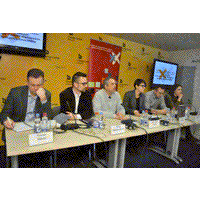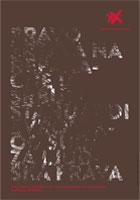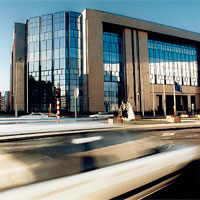Meeting of Organizations from the Region Documenting Human Rights Violations

 A consultative meeting with representatives of organizations from the region working on documenting human rights violations committed during and in connection with the wars in the former Yugoslavia during the 1990’s was held on February 4th, 2016, in the Library of the Humanitarian Law Center (HLC). Representatives of the Center for Democracy and Transitional Justice (BiH), Association of Women from Prijedor “Izvor” (BiH), Center for Dealing with the Past – Documenta (Croatia), Vojvodinian Civic Center (Serbia), Youth Initiative for Human Rights in Croatia, Association of Witnesses and Survivors of Genocide (BiH), Association of Concentration Camp Survivors in Bosnia and Herzegovina (BiH), the Engine Room (Croatia), Sandžak Committee for the Protection of Human Rights and Freedoms (Serbia), the HLC and HLC Kosovo participated in this meeting.
A consultative meeting with representatives of organizations from the region working on documenting human rights violations committed during and in connection with the wars in the former Yugoslavia during the 1990’s was held on February 4th, 2016, in the Library of the Humanitarian Law Center (HLC). Representatives of the Center for Democracy and Transitional Justice (BiH), Association of Women from Prijedor “Izvor” (BiH), Center for Dealing with the Past – Documenta (Croatia), Vojvodinian Civic Center (Serbia), Youth Initiative for Human Rights in Croatia, Association of Witnesses and Survivors of Genocide (BiH), Association of Concentration Camp Survivors in Bosnia and Herzegovina (BiH), the Engine Room (Croatia), Sandžak Committee for the Protection of Human Rights and Freedoms (Serbia), the HLC and HLC Kosovo participated in this meeting.







 On January 22nd, 2016, the Humanitarian Law Center (HLC) presented the report “Victims’ Right to Reparation in Serbia and the European Court of Human Rights Standards”. The Report sums up the findings about the legal framework and the practice of respect for the right of victims of human rights violations committed during the 1990s to reparation, as evidenced during 2014 and 2015, in relation to the standards of the European Court of Human Rights. Approximately 40 representatives of civil society, victims’ associations, the media, embassies and international organizations participated in the Conference.
On January 22nd, 2016, the Humanitarian Law Center (HLC) presented the report “Victims’ Right to Reparation in Serbia and the European Court of Human Rights Standards”. The Report sums up the findings about the legal framework and the practice of respect for the right of victims of human rights violations committed during the 1990s to reparation, as evidenced during 2014 and 2015, in relation to the standards of the European Court of Human Rights. Approximately 40 representatives of civil society, victims’ associations, the media, embassies and international organizations participated in the Conference.
 For societies that have experienced periods of massive human rights violations, the issue of reparations for victims is one of the most important elements for the establishment of the rule of law and creating solidarity and a human rights culture.
For societies that have experienced periods of massive human rights violations, the issue of reparations for victims is one of the most important elements for the establishment of the rule of law and creating solidarity and a human rights culture.  The Humanitarian Law Center (HLC) will present the report “Victims’ Right to Reparation in Serbia and the European Court of Human Rights Standardsˮ on Friday, January 22nd, 2015 at 1:00pm, at the Media Centre in Belgrade (Terazije 3, II floor).
The Humanitarian Law Center (HLC) will present the report “Victims’ Right to Reparation in Serbia and the European Court of Human Rights Standardsˮ on Friday, January 22nd, 2015 at 1:00pm, at the Media Centre in Belgrade (Terazije 3, II floor).

 The Council of the European Union (EU) adopted the
The Council of the European Union (EU) adopted the 

 The European Commission (EC) published the
The European Commission (EC) published the  The trial against an officer and a non-commissioned officer in the Serbian Army, Pavle Gavrilović and Rajko Kozlina, for the crime committed against a civilian population in the village of Trnje in March 1999, continued on Tuesday and Wednesday, October 27th and 28th, 2015, in Courtroom 2 of the Special Court. After the
The trial against an officer and a non-commissioned officer in the Serbian Army, Pavle Gavrilović and Rajko Kozlina, for the crime committed against a civilian population in the village of Trnje in March 1999, continued on Tuesday and Wednesday, October 27th and 28th, 2015, in Courtroom 2 of the Special Court. After the